| Welcome to
the Radford University Dietetic Internship
Program website. We will try to help you find what
you are looking for whether it is program information or application
materials.
The RU Dietetic
Internship is a graduate certificate program housed in the
School of Nursing, Foods and Nutrition Program within the Waldron
College of Health and Human Services.

The Radford University
Dietetic Internship Program is currently granted Initial
Accreditation by the Commission on Accreditation for Dietetics Education
of The American Dietetic Association as of July 2003. This
post-baccalaureate graduate certificate program has an emphasis in
medical
nutrition therapy and is designed to prepare dietitians to work in
both interdisciplinary environments and in rural settings. We
are approved to accept 7 interns.
RU
Dietetic Internship Mission Statement
The Radford University
Dietetic Internship extends the mission of the University and College, by
preparing future professionals who are ethical, knowledgeable, culturally
sensitive, able to work collaboratively as well as independently, and who
are committed to life-long learning. The Dietetic Internship will
allow modeling of best practice methods to deliver high quality nutrition
and dietetic care to promote, protect and restore a client's health.
Dietetic
Internship Program
Goals
|

|
Provide an internship
with a minimum of 900 hours of supervised practice experience with a
Medical Nutrition Therapy emphasis highlighting the special
healthcare needs in rural settings.
|
|

|
Provide opportunities
for interdisciplinary experiences to enhance leadership skills.
|
|

|
Teach at least 2
advanced clinical skills such as use of the metabolic cart and
waivered point-of-care testing such as blood glucose monitoring that
will make dietitians more valuable in the workplace.
|
|

|
Recruit and retain
qualified dietetic interns from residents of southwest Virginia and
other rural settings.
|
|

|
Promote the Professional
Standards of Practice of The American Dietetic Association and the
Code of Ethics.
|
|

|
Prepare the interns for eligibility
to take The American Dietetic Association's national registration
examination to become a Registered Dietitian.
|
 |
Strengthen the intern's
ability to develop self-direction and creative problem-solving
skills to assume leadership roles in dietetics practice. |
|
|
Requirements
for Admission
Successful
candidates will have:
Estimated
Costs Estimated
costs for the year:
|
Costs |
Virginia
Resident |
Out-of-State
Residents |
|
Tuition* |
$4068.00 |
$7506.00 |
|
Housing |
$500.00 /
month |
|
Books/Supplies |
$400.00 |
|
Transportation |
$1000.00 |
|
Health
Insurance |
$750.00/10
months |
|
Malpractice
Insurance |
$35.00/year |
|
Student ADA
membership |
$43.00/year
|
|
White Lab Coat |
$25.00 |
|
Stethoscope/BP
Cuff |
(optional) |
|
Recommended |
Drivers License and Car
(required)
Laptop Computer w/Office XP,
Zip Drive
Internet Access |
|
* RU Tuition increase
effective 5/7/04; subject to change for
Fall 2005. Deadlines for tuition & fees payments follow
RU schedule.
|
|
Scholarships
/ Financial Aid
|
|
Interns
automatically qualify for RU Foundation Scholarships.
Students interested in financial aid need to contact RU's Financial
Aid Office.
Be sure to speak with Stephanie Clement.
American Dietetic Association Scholarships & Financial Aid
Virginia Dietetic
Association Scholarships
|
|
Dietetic
Internship Program
Highlights
|
- Medical Nutrition Therapy Emphasis
|
- Excellent Preceptors/Faculty
|
- Rural Educational Experiences
|
- Scholarship Opportunities
|
- Interdisciplinary Learning
Opportunities
|
|
|
|
|
|
Accomplishments |
- ADA Student Awards Winners
2001, 2002, 2003
|
- Alumni Awards "Recognized Young
RD of the Year 2003"
|
|
|
|
 Medical Nutrition
Therapy Emphasis
Medical Nutrition
Therapy Emphasis
|
The RU Dietetic Internship
has designated a MNT emphasis that corresponds to 11 specific
competencies (NT). Some examples are listed below.
|
|
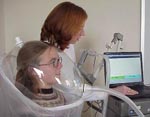
|
NT
4: Select, monitor, and evaluate complex enteral and
parenteral nutrition regimens. |
|
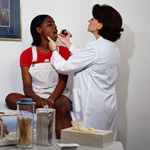
|
NT
7: Perform basic physical assessment
|
|
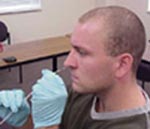
|
NT
8: Participate in nasoenteric feeding tube placement and care
|
|
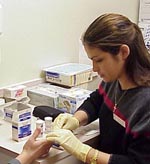
|
NT
9: Participate in waivered point-of-care testing, such as
blood glucose monitoring |
|

|
NT 10: Participate
in the care of patients/clients requiring Adaptive Feeding Devices
|
 Rural /
Interdisciplinary Experiences
Rural /
Interdisciplinary Experiences
|
Interns are
involved in a variety of both rural and interdisciplinary supervised
practice experiences throughout the internship. Some examples
include:
|
|
Waldron
College of Health & Human Services
School of Allied Health, Foods & Nutrition, Dietetic
Internship
School of Nursing
School of Social Work
Radford Clinic |

|
|
RU
Mobile Unit taking interdisciplinary healthcare teams to rural
southwest Virginia. |
 |
|
The
Waldron College of Health & Human Services hosted a "Health
Fair" in October 2000. Students from all programs
participated. |

|
|
Rural
Internship Rotation sites allow interns to gain
experience in dealing with some of the special healthcare
issues of rural citizens. |

|
 Upskilling Opportunities
Upskilling Opportunities |
Interns learn numerous
upskilling techniques to enhance their professional marketability
and flexibility as nutrition practitioners.
|
|
Indirect
Calorimetry
Oxygen Consumption
Carbon Dioxide Production
Respiratory Quotient
Resting Energy Expenditure
|
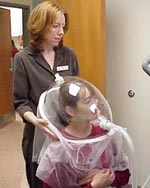 |
|
Bioelectric
Impedance
for
Body Composition Analysis |
 |
|
Waivered
Point-of-Care Testing
Blood
Glucose Monitoring
Cholesterol Screening |
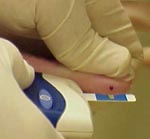
|
|
Conduct
general health assessment |
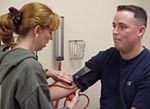 |
|
Osteoporosis
Screening
and
Nutrition Counseling |
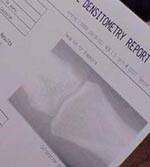
|
|
Other Upskilling Opportunities:
CPR Training/Certification
Conflict Resolution Training/Certification
Dysphagia Screening
Physical Assessment
|
 Technology & Multimedia
Technology & Multimedia |
|
Integrated
throughout the internship experience are opportunities to learn
& utilize state of the art technology. |

|
|
Multimedia
Classes
Advance Power Point
Web Design
Digital Photography
Video Production |
 |
|
Sample of Intern Projects |
|
Public Service Radio Announcements
"Nutrition Counts"
|
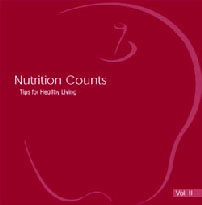 |
|
Digital
Portfolios
Interns
create & continue to add to a digital database to make their own
digital portfolio and then produce it as a CD-ROM.
Click name to Preview:
Monica Dickenson
Kate Hunter
Ellie Davis
Alison Hawley
(Click arrow to advance slides)
|

|
|
Video
Production
"Is Dietetics for You?"
 |
Click here to Preview Video
OR
Click Here to View Entire Video
Download
Real Player

|
|
Dietetic
Internship Curriculum
Course
Descriptions |
FDSN 600 Advanced Nutrition Assessment (3
credits):
Integration
of pathophysiology of major organ systems and disease states and how
these, in turn, relate to nutritional status, requirements and clinical
nutrition interventions using problem-based learning and critical
thinking.
FDSN 690
Dietetic Practicum (1- 6 credits): Addresses
47 core competencies and 11 competencies for the medical nutrition therapy
for dietetic interns which is required by the American Dietetic
Associationís Accrediting Commission for Dietetic Internships. A minimum of 900 clock hours of supervised practice
experience will be provided at a variety of food service, community and
clinical settings. These
supervised practice experiences will be complemented with weekly classroom
time modeling critical thinking and evidence-based decision making
methodology throughout the 10-month internship.
FDSN 601 Critical Care Nutrition (3 credits):
In-depth instruction in the critical care nutrition management specific to
critically ill patients. Basic principles of hemodynamic monitoring,
acid-base regulation/assessment, mechanical ventilation, effects of
surgical procedures impact on nutritional status and management will be
discussed using problem-based learning, clinical application and critical
thinking analysis.
|
Semester |
Courses |
Credits |
|
Fall |
FDSN 600 Advanced Nutrition
Assessment
FDSN 690 Dietetic Practicum |
3
6 |
|
Spring |
FDSN 690 Dietetic Practicum
FDSN 601 Critical Care Nutrition |
6
3 |
|
Dietetic
Internship Rotations |
Preceptor / Rotation
sites are selected to best serve the curriculum needs of the
internship program. There are presently 2 intern positions
located in the Lynchburg, VA area, 2 interns in the Radford/Roanoke
area and 1 intern in Southwest Virginia / West Virginia. For that reason,
Interns are advised to locate in one of these geographic
regions.
|
| Foodservice
Management |
5 weeks |
| Community |
10 weeks |
| Critical Care |
TBA |
| Clinical - Rural
Hospital |
6 weeks |
| Clinical |
12 weeks |
Calendar
2004 - 2004
Meet
the Interns
Electronic Newsletter
 |


![]()